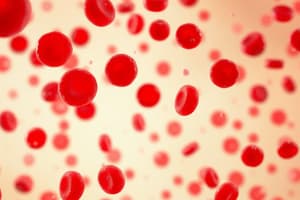Podcast
Questions and Answers
Which of these are the three general schemes of anemia classification?
Which of these are the three general schemes of anemia classification?
- Bone marrow responsiveness (correct)
- Morphological classification via RBC size and Hgb concentration (correct)
- Hemoglobin level measurement
- Pathophysiological mechanism (correct)
What is morphological classification of anemia based on?
What is morphological classification of anemia based on?
MCV and MCHC
What defines microcytic anemia?
What defines microcytic anemia?
Erythrocytes are small
What defines normocytic anemia?
What defines normocytic anemia?
What defines macrocytic anemia?
What defines macrocytic anemia?
What is hypochromic anemia?
What is hypochromic anemia?
What is normochromic anemia?
What is normochromic anemia?
Hyperchromic anemia occurs frequently.
Hyperchromic anemia occurs frequently.
What can diagnostically cause hyperchromic anemia?
What can diagnostically cause hyperchromic anemia?
What factors classify anemia based on bone marrow response?
What factors classify anemia based on bone marrow response?
If an animal is anemic for more than 5 days with no increase in reticulocytes, then the bone marrow is non-responsive and the anemia is ________________.
If an animal is anemic for more than 5 days with no increase in reticulocytes, then the bone marrow is non-responsive and the anemia is ________________.
What indicates regenerative anemia?
What indicates regenerative anemia?
What defines non-regenerative anemia?
What defines non-regenerative anemia?
What can help determine if anemia is regenerative or non-regenerative when polychromatophils cannot be seen?
What can help determine if anemia is regenerative or non-regenerative when polychromatophils cannot be seen?
What are reticulocytes?
What are reticulocytes?
Reticulocyte count is the __________________?
Reticulocyte count is the __________________?
What is reticulocyte count used to determine?
What is reticulocyte count used to determine?
What characteristics define reticulocyte cells?
What characteristics define reticulocyte cells?
How long does it take for dog reticulocytes to mature to a mature RBC?
How long does it take for dog reticulocytes to mature to a mature RBC?
How long does it take for cat reticulocytes to mature to a mature RBC?
How long does it take for cat reticulocytes to mature to a mature RBC?
What is the time frame for evidence of a regenerative response after blood loss?
What is the time frame for evidence of a regenerative response after blood loss?
When is the peak reticulocyte count reached?
When is the peak reticulocyte count reached?
What are the relative reticulocyte concentrations in healthy animals?
What are the relative reticulocyte concentrations in healthy animals?
Would you use retic % or absolute number of retics for more value?
Would you use retic % or absolute number of retics for more value?
Reticulocytes should be _______ the reference interval to definitely say the anemia is _______________.
Reticulocytes should be _______ the reference interval to definitely say the anemia is _______________.
How does the assessment of regenerative response to anemia differ in equids?
How does the assessment of regenerative response to anemia differ in equids?
Polychromasia can be used as an indicator of regeneration in horses.
Polychromasia can be used as an indicator of regeneration in horses.
What indicates a regenerative response in horses?
What indicates a regenerative response in horses?
Flashcards are hidden until you start studying
Study Notes
General Classification of Anemia
- Three classification schemes: morphological, bone marrow responsiveness, and pathophysiological mechanism.
- Morphological classification focuses on RBC size and hemoglobin concentration.
- Bone marrow responsiveness is assessed by reticulocyte presence.
- Pathophysiological mechanism relates to the underlying disorder.
Morphological Classification of Anemia
- Based solely on MCV (Mean Corpuscular Volume) and MCHC (Mean Corpuscular Hemoglobin Concentration).
- Categories include:
- Microcytic anemia: small erythrocytes.
- Normocytic anemia: normal volume RBCs.
- Macrocytic anemia: larger than normal RBCs.
- Hypochromic anemia: low hemoglobin concentration in cells.
- Normochromic anemia: normal hemoglobin concentration.
- Hyperchromic anemia: does not occur physiologically; falsely increased MCHC.
Hyperchromic Anemia Causes
- Can be caused by intravascular hemolysis, Heinz bodies, or lipemia.
Bone Marrow Response Classification
- Anemia classification also involves bone marrow response assessment through polychromatophils and reticulocytes.
- Non-regenerative anemia occurs with no increase in reticulocytes after 5 days of anemia.
Characteristics of Anemia Types
- Regenerative anemia is indicated by the presence of polychromatophils and larger RBCs.
- Non-regenerative anemia lacks large polychromatophils.
Reticulocytes Overview
- Reticulocytes are young erythrocytes released in response to anemia caused by hemolysis or blood loss.
- Reticulocyte count offers insight into marrow response to anemia.
- Count reflects the percentage of total RBCs that are reticulocytes.
Reticulocyte Count Specifics
- Used to gauge the marrow's response to anemia, particularly after blood loss.
- Dogs' reticulocytes mature in 24-48 hours; cats have two types of reticulocytes with different maturation timelines (2-3 weeks).
Regenerative Response Timing
- Evidence of regenerative response typically seen 2-4 days after acute anemia, peaking at 5-7 days.
- Horses do not release reticulocytes in response to anemia.
Reticulocyte Concentration in Healthy Animals
- Normal values are 0-60k in dogs/cats; no reticulocytes in normal cattle, sheep, goats, or llamas; equids do not show reticulocyte release.
Assessment Tips
- Absolute number of reticulocytes provides more valuable information than percentage alone.
- Reticulocyte counts must be above the reference interval to indicate anemia is regenerative.
Equine Considerations
- In horses, reticulocytes are not released from the marrow during regenerative anemia.
- Polychromasia is not a reliable indicator of regeneration in horses.
- Signs of regenerative response in horses include macrocytes, increased MCV, anisocytosis, and erythroid hyperplasia in bone marrow.
Studying That Suits You
Use AI to generate personalized quizzes and flashcards to suit your learning preferences.




